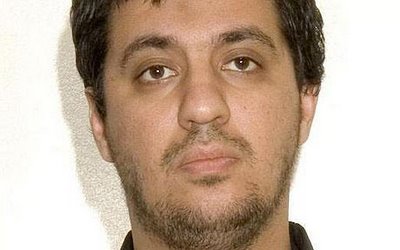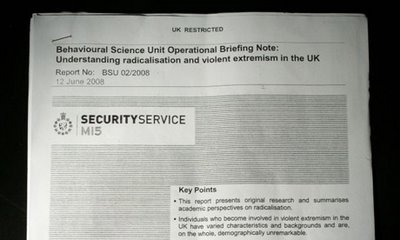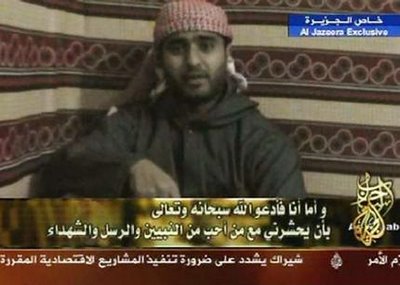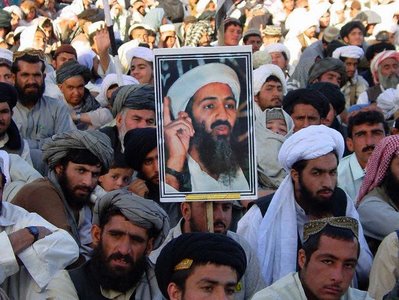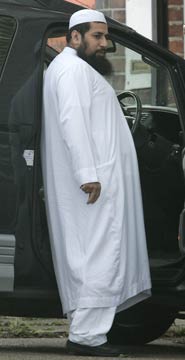 After a slight hiatus, the past week has seen something of a renewed desire to try to make mountains out of molehills. First up, Newsnight on Wednesday dwelled heavily on a report (PDF) from the Centre of Social Cohesion, itself an off-shoot of the right-wing thinktank Civitas, which discovered that libraries tend to have books in them. Yeah, I was surprised as well: I'd assumed that they'd been abolished a few years back in favour of filling the buildings with DVDs, CDs, computers plugged into the internet and coffee shops.
After a slight hiatus, the past week has seen something of a renewed desire to try to make mountains out of molehills. First up, Newsnight on Wednesday dwelled heavily on a report (PDF) from the Centre of Social Cohesion, itself an off-shoot of the right-wing thinktank Civitas, which discovered that libraries tend to have books in them. Yeah, I was surprised as well: I'd assumed that they'd been abolished a few years back in favour of filling the buildings with DVDs, CDs, computers plugged into the internet and coffee shops.
To be serious for a second, the most eye-catching part of the report was that they'd found two books by Abu Hamza and one by Sheikh Abdullah al-Faisal in Tower Hamlets' Islamic collection. Both men are currently serving time for incitement to murder. Let's get the condemnation out of the way: it ought to be obvious to anyone that books by those two perhaps shouldn't be on the shelves, as likely as they are to cause gratuitous offense, and at the very least they should perhaps be kept back and only loaned out on specific request. Where, however, do you draw the line? Throughout the discussion, politicians and commentators alike couldn't get enough references and comparions to Mein Kampf in, yet we have no problems with that remaining on the library shelves. One of my more optimistic sixth-form history teachers even suggested at one point that we read it. I think we declined her kind offer.
The rest of the report mainly dealt with the fact that the Tower Hamlets council's Islamic collection (the report itself also deals with what it found on the shelves of Waltham Forest and Birmingham council's collection) also had 11 copies of Sayid Qutb's Milestones, a well-known radical text which has influenced jihadists as well as the Muslim Brotherhood which Qutb belonged to, and also books by Muhammad ibn Abdul Wahhab and Muhammad Jamil Zino, which contained such charming theoretical questions and answers as:
"Is it allowed to support and love disbelievers?" he asks. The answer is simply "no".
Well, there go my chances of copping off with an niqab-wearing babe.
The problem is, as Douglas Murray, co-author of the report admits on his blog posting responding to the council's responses, many of the writings are historic and scholarly works. One of the first places to go to understand the jihadi mindset is to read Qutb, who famously went to America in the late 40s, had a woman come on to him and recoiled like a teenager caught looking at pornography by his mother. It's one thing discarding "Women who deserve to go to hell", curiously written by the armless Hamza, quite another to then start accusing libraries of providing "Hate on the State" by stocking Qutb. Incidentally, in case some of you were wondering, Murray is indeed the same Murray who has recently popped up on Question Time and been roundly disliked for having all the personality and charm of a randy rhino, and he has his own humourous literary creation, Neoconseservatism: Why We Need It, filling up remainder buckets as you read this.
To be clear, it's not as though Murray and his cohorts are advocating removing such books from the shelves altogether, just that they need to be balanced with more liberal scholarly interpretations of Islam, which is a decent aim. It does however seem something of a cheap shot, being purely used to bash the liberal consensus with. It's not as if books/speeches by all the above are not freely available online: Qutb's Wikipedia page links directly to Milestones, provided by err, an anti-Islamist website. It's also well known, despite constant attempts to suggest otherwise, that the vast majority of radicalisation is not currently occurring either in mosques or universities, but online, through personal research or meeting like-minds. It's that we have to quickly learn how to tackle, not keep watch on who's taking out semi-coherent rants by bearded fanatics.
Today's story in the Times is broadly similar, except ever so slightly more hysterical:
Hardline takeover of British mosques
Almost half of Britain’s mosques are under the control of a hardline Islamic sect whose leading preacher loathes Western values and has called on Muslims to “shed blood” for Allah, an investigation by The Times has found. Riyadh ul Haq, who supports armed jihad and preaches contempt for Jews, Christians and Hindus, is in line to become the spiritual leader of the Deobandi sect in Britain. The ultra-conservative movement, which gave birth to the Taleban in Afghanistan, now runs more than 600 of Britain’s 1,350 mosques, according to a police report seen by The Times.
Ignore the bit about hardline takeover of British mosques; it's bollocks. The Deobandi "sect" has long been popular in this country, and saying it gave birth to the Taliban, while strictly true, is similar to suggesting that the co-operative movement gave birth to Stalinism.
Rather what the Times has uncovered is that Riyadh ul Haq, now predicted to become the spiritual leader of the Deobandis in the UK by becoming the head of the influential Bury seminary, has made a series of speeches which vary from the idiotic (calling New York "Jew York") to those similar to the remarks featured in the Dispatches documentary Undercover Mosque (“Allah has warned us in the Koran, do not befriend the kuffar [unbelievers], do not align yourselves with the kuffar”). Unlike the Channel 4 documentary, the Times has avoided the accusation of selectively quoting or taking the remarks out of context, publishing 5 of the speeches in full.
It appears then that ul Haq is, to quote one of David T from Harry's Place's comments on CiF:
- preaching the nastiest racism about jews and calling for god to punish jews. - praising the Taliban
- telling muslims not to be friends with, or behave in any way like, non-muslims
Which does pretty much sum it up. It is also highly disconcerting that this man, with such views once he's out of earshot or sight of "non-Muslims", is apparently about to take over as the spiritual leader of the Deobandis in this country. His views need to be condemned, ridiculed and contradicted, as does those at least of two of his students, also quoted making similar comments.
Let's not give into a fantasy however that this is what is being preached in all 600 of those mosques every Friday. The Times does attempt to cover its bases by including interviews with two other graduates of the Bury seminary who repudiate ul-Haq's speeches, saying in the original article that "It is not suggested that all British Muslims who worship at Deobandi mosques subscribe to the isolationist message preached by Mr ul Haq" and in a second article going out of its way to be as reasonable as possible, mentioning that "in one talk, Mr ul Haq tells British Muslims that he is 'not suggesting that we should rise here - I'm sure we are all sensible enough to know that" and "we will not endanger the life of any innocent person" but at its core this is still a piece designed to cause not just concern, but anger, dismay and fear at what is potentially being preached throughout the country. It comes at a time when, as Sunny writes today on Pickled Politics, ever more disparate but liberal brown voices are making themselves heard, and when the government itself admits that it hasn't been listening widely and broadly enough. The last thing we need is to get back into the cycle from last year where for a time there seemed to be a free for all in in attacking Muslims as a whole.
This is not to underestimate the seriousness that the views of a minority can pose. This though is an example of how a well-sourced, balanced article quickly gets turned on its head, containing none of the caveats of the original:
Hate sect runs 600 mosques
NEARLY half of Britain’s mosques are run by an Islamic sect that orders followers to “shed blood” for Allah, it emerged last night.
A probe by The Times revealed more than 600 out of 1,350 mosques are controlled by the extremist Deobandi sect, which helped create the Taliban in Afghanistan. One of the movement’s most senior clerics is British-born Riyadh Ul Haq, a hardline preacher once quizzed by cops over a fatal shooting in Leicester in 2003. He has branded New York “Jew York” in sermons and has also warned followers they should distance themselves from the “kuffar” (non-believers).
In another sermon, about Israel, Ul Haq warned: “We will consider it an honour and a privilege to shed blood.”
And so on. Where is this rewriting of the original from? From within the same building.
We have to be better at countering this than just issuing damp apologetics, as both Ajmal Masroor and Inayat Bunglawala do on CiF. We have to ask why we don't already know about how such views are being preached at such a high level. We can't pretend it isn't there, or that it will go away. What we can do is found out why this isn't such common knowledge, and move on from there into countering such a message. At the same time, we have to remember, that this is the view of 99%, as elucidated by Sheikh Ibrahim Mogra:
I don’t see why my creator would want me not to live in peace and harmony with my non-Muslim neighbours. This is a country which allows me to be a Muslim and which gives us so many freedoms. My Government has done some things that I’m not proud of, but a lot more that I am very proud of. I would not wish to live anywhere else.
Labels: British Muslims, Civitas, Ctre of Social Cohesion, Deobandis, Douglas Murray, Hate on the State, Muslim bashing, racism, radicalisation, Riyadh ul Haq, Sayyid Qutb, Sheikh Ibrahim Mogra, Tower Hamlets
